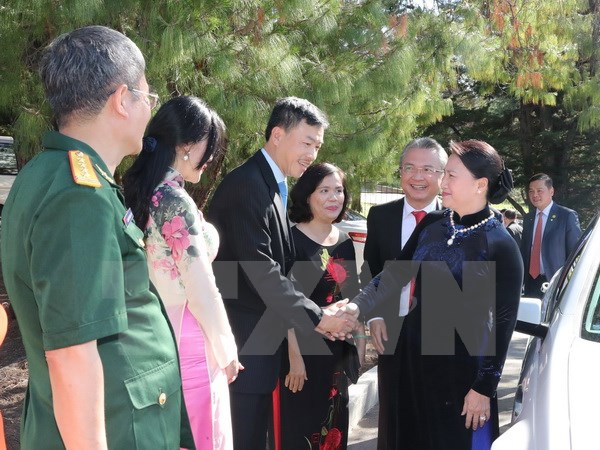 National Assembly Chairwoman Nguyen Thi Kim Ngan (R) meet staff at the Vietnamese Embassy and representatives of Vietnamese people in Australia on November 29 (Photo: VNA)
National Assembly Chairwoman Nguyen Thi Kim Ngan (R) meet staff at the Vietnamese Embassy and representatives of Vietnamese people in Australia on November 29 (Photo: VNA)Canberra (VNA) – National Assembly ChairwomanNguyen Thi Kim Ngan met with staff at the Vietnamese Embassy andrepresentatives of Vietnamese people in Australia on November 29, part of herofficial visit to the country.
Ambassador Ngo Huong Nam reported that more than300,000 Vietnamese people in Australia form the third biggest Vietnamesecommunity in the world and the fifth largest ethnic community in Australia.They are assessed as a successful community with close integration into thelocal society. About 30,000 Vietnamese students in Australia is also a majorcommunity of foreign students here.
The Vietnamese community in Australia has been abridge helping to enhance the two countries’ friendship and cooperation, henoted.
Representing the expatriates, President of theVietnamese Business Association in Australia Tran Ba Phuc, environmental expertNguyen Dang Thang and Do Anh Tuan from the Vietnamese Student Association inAustralia said overseas Vietnamese always want to make practical contributionsto the homeland.
[Photos: Top legislator active in Australia]
In recently years, they have worked with theEmbassy, the Consulate General and other representative agencies of Vietnam inAustralia to organise many workshops introducing Vietnam’s investmentenvironment, taken part in the “Vietnamese people prioritise using Vietnamesegoods” campaign, and connected Australian businesses with Vietnamese firms.
For her part, Chairwoman Ngan said the growth ofVietnam-Australia relations in all fields is partly attributable to efforts bythe Vietnamese Embassy, agencies, businesses and people in Australia.
Appreciating contributions by the Vietnamesecommunity, she promised to send their opinions to domestic relevant agenciesfor consideration and settlement.
She affirmed the Party and State’s policy ofcreating favourable conditions for overseas Vietnamese people to stabilisetheir lives and integrate into local society while preserving their traditionalcultural identity and contributing to the homeland.
The NA leader also stressed the role of themother tongue in maintaining traditional culture, asking the expatriates tofurther teach Vietnamese to their descendants.-VNA





























